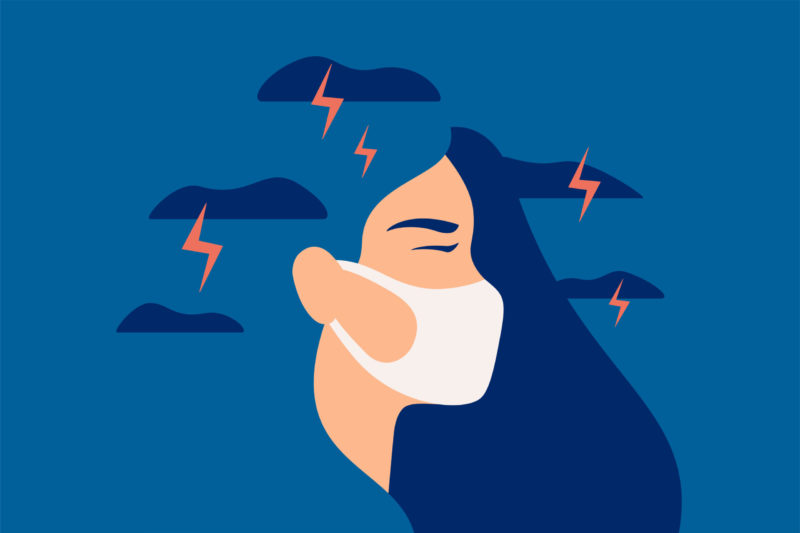Learn more about our FREE COVID-19 Patient Support Program for chronic illness patients and their loved ones.
Although many people who are diagnosed with COVID-19 recover within a few weeks, an August 2020 study estimated that about 10 percent of people diagnosed with COVID-19 experience prolonged illness. Known as long-haulers, these individuals take longer to recover and may experience ongoing symptoms long after they’ve tested negative for the virus. These symptoms range from respiratory issues, to chronic fatigue, to loss of taste and smell. And now, a new study suggests having COVID-19 could increase your chances of experiencing a psychiatric or neurological illness post-diagnosis.
For the study, which was published in The Lancet Psychiatry, researchers analyzed the health records of 577,996 patients. Of the total number of patients, 236,379 were diagnosed with COVID-19 between January 20, 2020 and December 13, 2020. These patients’ outcomes were compared to those of 105,579 patients diagnosed with the flu and 236,038 patients diagnosed with any respiratory tract infection during the same time period.
The researchers then evaluated the records for one or more of the following neurological or psychiatric ailments:
- Intracranial hemorrhage
- Ischaemic stroke
- Parkinson’s disease and parkinsonism
- Guillain-Barré syndrome
- Nerve, nerve root, and plexus disorders
- Neuromuscular disorders, such as myoneural junction and muscle disease
- Encephalitis
- Dementia
- Psychotic, mood, and anxiety disorders (assessed as a group, as well as individually)
- Substance use disorder
- Insomnia
The researchers found that six months after being diagnosed, one in three COVID-19 patients experienced a psychiatric or neurological illness. What’s more, about one in eight of the COVID-19 patients (12.8 percent) were diagnosed for the first time with such an illness.
The numbers were even higher for those who had severe COVID-19. An estimated 46 percent of COVID-19 patients who had been admitted to intensive care had a neurological or psychiatric diagnosis in the following six months. The prevalence of first-time diagnoses among these patients was 26 percent.
Overall, neurological and psychiatric conditions were 44 percent more common in patients who had COVID-19 compared to those who had the flu.
Patients who had COVID-19 also had nearly double the rate of first-ever neuropsychiatric diagnoses than patients who had the flu or other non-COVID respiratory infections.
Psychiatric illnesses were the most common diagnoses among COVID-19 patients:
- 17% of patients were diagnosed with anxiety disorders
- 14% of patients were diagnosed with mood disorders
- 7% of patients were diagnosed with substance use disorders
Insomnia was also common, with 5 percent of COVID-19 patients diagnosed with it.
The occurrence of neurological disorders was lower than psychiatric illnesses, but still higher among patients with COVID-19 than patients who were diagnosed with the flu or respiratory tract infection:
- 1% of patients were diagnosed with ischemic stroke
- Less than 1% of patients were diagnosed with dementia
- Less than 1% of patients were diagnosed with brain hemorrhage
The researchers did not see a higher risk of Parkinson’s disease or Guillain-Barré syndrome in COVID-19 patients compared to flu patients. They did, however, see a significantly greater risk of all diagnoses in COVID-19 patients compared to patients who had other respiratory tract infections.
COVID-19 has been linked to a number of mental health issues, including increased levels of anxiety in rheumatoid arthritis patients. Additionally, some data suggests that people with mental health conditions are more likely to get COVID-19 — and vice versa.
This study’s results may underscore the need for psychiatric or neurological screenings and care after a COVID-19 diagnosis, as well as more research into the implications of mental and brain health after COVID-19.
“The present data show that COVID-19 is followed by significant rates of neurological and psychiatric diagnoses over the subsequent six months,” researchers wrote. “Services need to be configured, and resourced, to deal with this anticipated need.”
Get Mental Health Support
We understand how difficult it can be to cope during these uncertain times, especially when you are living with chronic illness. It is important to talk to someone who can help. You should contact your primary care physician or your insurance provider to learn about the supportive resources that are available to you. Here are other mental health resources for your reference:
- To find local support groups and services, you can call 1-800-950-NAMI (6264) or email info@nami.org. The National Alliance on Mental Illness HelpLine can be reached Monday through Friday, 10 AM to 6 PM ET.
- For a counselor or therapist in your area, view the resources page at Mental Health America: Finding Therapy.
- Crisis Text Line (free 24/7 support via text): Text HOME to 741741
- The Friendship Line from the Institute on Aging (toll-free 24/7 support for people ages 60 or over and adults living with disabilities): 1-800-971-0016
- LGBT National Hotline (free, confidential support for the lesbian, gay, bisexual, transgender, queer, and questioning community): 1-888-843-4564
- If your mental health concern is an emergency for you or someone else, you should call 911.
- If you are having suicidal thoughts or have or are thinking of hurting yourself, you should call the National Suicide Prevention Lifeline’s 24-hour toll-free crisis hotline, 1-800-273-TALK (8255).
Get Free Coronavirus Support for Chronic Illness Patients
Join the Global Healthy Living Foundation’s free COVID-19 Support Program for chronic illness patients and their families. We will be providing updated information, community support, and other resources tailored specifically to your health and safety. Join now.
Greenhalgh T, et al. Management of post-acute covid-19 in primary care. British Medical Journal. August 11, 2020. doi: https://doi.org/10.1136/bmj.m3026.
Taquet M, et al. 6-month neurological and psychiatric outcomes in 236 379 survivors of COVID-19: a retrospective cohort study using electronic health records. The Lancet Psychiatry. April 6, 2021. doi: https://doi.org/10.1016/S2215-0366(21)00084-5.






